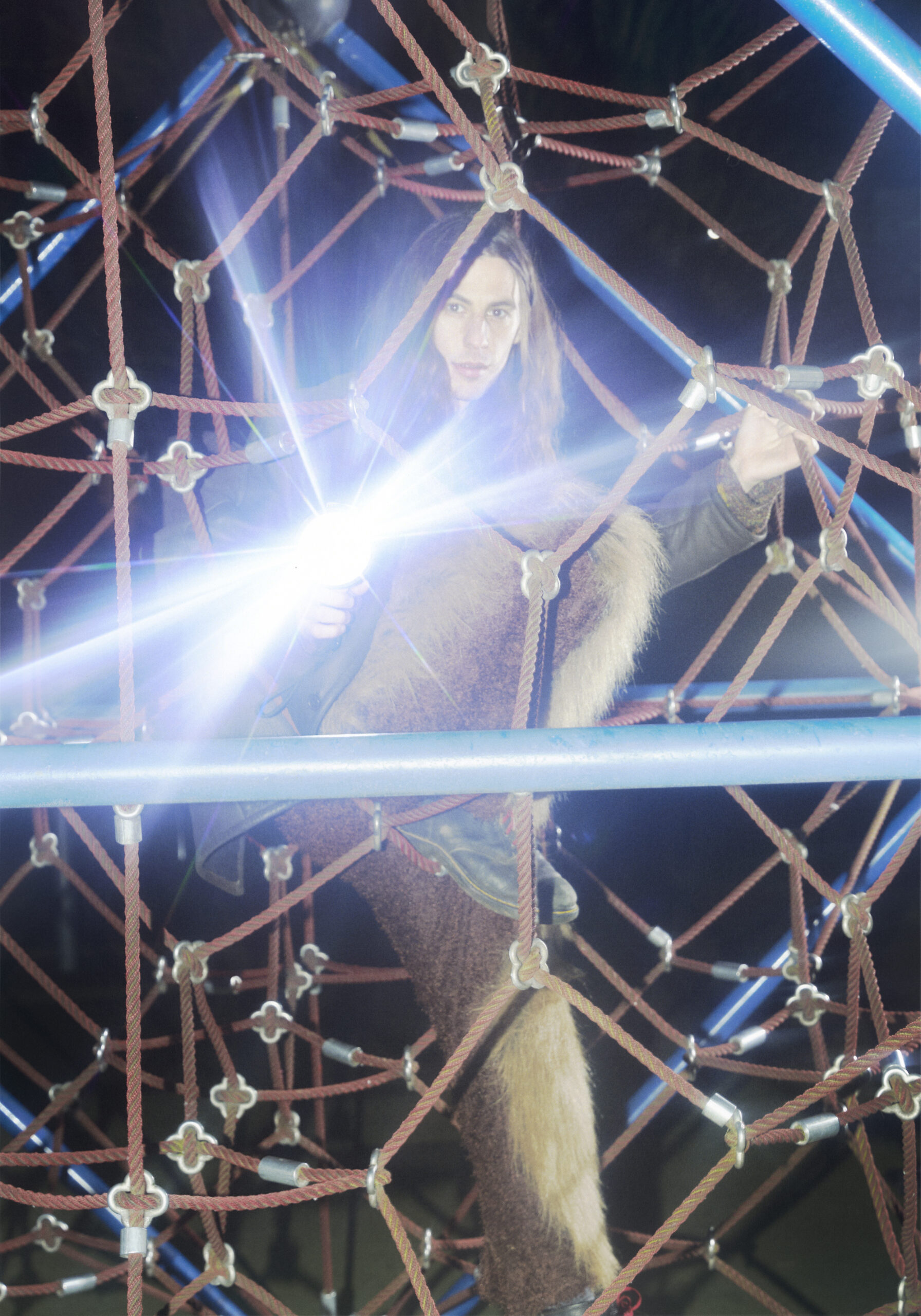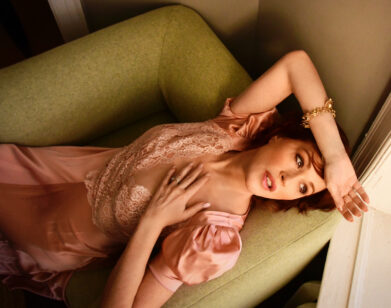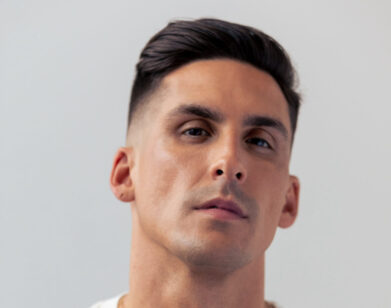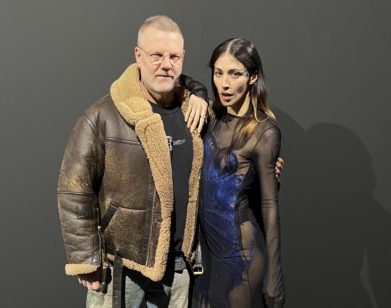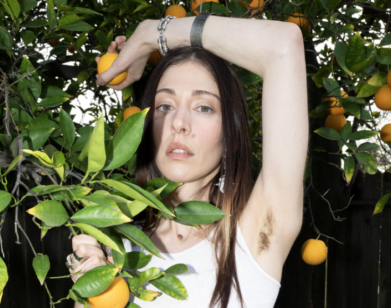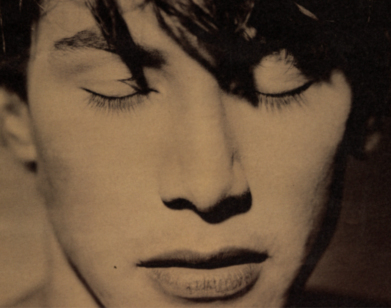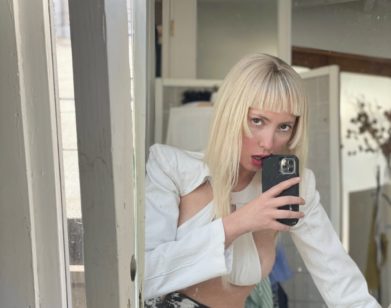PHILHARMONIC
With Last Days, Matt Copson Is Here to Revive the Opera
Kids don’t like opera these days, unless Matt Copson is involved. The multimedia artist first debuted his one-act opera Last Days in London in 2022, a work loosely based on the 2005 Gus Van Sant film of the same name. Last Tuesday, at the Walt Disney Concert Hall in Los Angeles, Copson directed the opera in a one-off performance in a city best known for its celluloid mania.
Written by Copson, Last Days follows Blake, a noncommital version of Kurt Cobain as he putters around his grungy Seattle home in the days just before his suicide. In contrast to our cultural romanticization of Cobain’s death, Copson instead focuses on the mundane intrusions–phone calls from Blake’s manager, doorbell rings from DHL drivers and evangelizing Mormons– that disrupt and shape the last precious hours of the harrowed icon’s life. Here, sound is equally important as it would be in a traditional opera; composer and frequent collaborator Oliver Leith created surreal diegetic soundscapes out of everyday noise like fake birdsong and the crunching of Lucky Charms cereal. The voice of Copson’s partner Caroline Polachek also makes an appearance on a prerecorded aria “Non Voglio Mai Vedere Il Sole Tramontare,” soaring to an impossibly high octave as Blake listens and sobs.
I spoke to Copson a few days after the performance, while he dealt with power outages from L.A.’s apocalyptic winter storm. We spoke about L.A.’s secret yen for theater, the singing candelabras of Beauty and the Beast, and death as the ultimate creator of meaning.
———
HANNAH GHORASHI: Did you get your wifi installed?
MATT COPSON: I got my internet fixed, yeah. There’s been this crazy storm in L.A.
GHORASHI: I’ve heard.
COPSON: It’s having its biblical moment. It’s a bit like in the UK when it snows, no one knows how to deal with it.
GHORASHI: And you had a very busy week. I heard that you hosted a party at the Chateau after the opera. Was it more fun than the Grammys party?
COPSON: Definitely, obviously. Opera brings people together more than pop music these days. [Laughs] We had a really fun, eclectic crowd and we went harder than the Grammys went.
GHORASHI: I know a lot of people that traveled from London just to see it.
COPSON: People had flown from London, New York, all over the place. It really felt like a big special event. Everyone got dressed up for the opera. It always strikes me as really strange that L.A., which is flooded with actors, is devoid of much theater, but there’s such a thirst and appetite for it. My friends Calla Henkel and Max Pitegoff have just taken over one of these old abandoned theaters. It’s called New Theater Hollywood. I’m really hopeful that there’s about to be a kind of explosion of theater. It’s kind of my prediction for the world.
GHORASHI: Why do you think there hasn’t been in L.A.?
COPSON: I think the circus of the film industry and the Netflix TV industry has taken over everything. And Downtown L.A. is a famous disaster because it’s been run appallingly on a city level, but it is full of these incredible art deco gilded theaters. There are all these incredible spaces that are just lying there waiting for something to happen.
GHORASHI: Some of the abandoned buildings in Downtown L.A. have a ghostly past.
COPSON: Totally. A lot of them were set up as Vaudeville theaters and cinemas that premiered Charlie Chaplin films and things. They’ve had checkered histories of being turned back into cinemas and then fading away again. Now, we’re in a moment where Netflix and A24 are buying up a bunch of these buildings—
GHORASHI: Oh, no.
COPSON: The physical cinema itself is in such crisis.
GHORASHI: What made you decide to move to L.A.? Because you’re from London, correct?
COPSON: I am from Oxford originally. I’ve lived in London ever since I studied at art school and I’ve been living on and off in L.A. since 2019, although I ended up spending COVID in London with Caroline [Polachek], my girlfriend. She’s obviously in pop music and there’s a huge basis for that over here. But I had a ton of British friends in the music scene. I went to art school with Charli XCX and she was kind of the first one to move out here and start doing stuff. Then all the PC music people joined. It always seemed like a fun and exciting place. London is so tough as an artist. I spent a decade trying to get oversized things onto tube carriages or buses to transport from one small studio to another. Out here those things come a little more easily. I’ve always been fascinated with entertainment on a material level, with lighting fixtures and stuff, and there’s a whole world of that out here.
GHORASHI: Right, because it’s hard to travel in London with everything you need to put on these theatrical pieces that you do.
COPSON: Exactly.
GHORASHI: This opera is based on the Gus Van Sant movie Last Days. Did you stay pretty faithful to the film?
COPSON: Not really, no. The film itself is quite a loose, tonal piece. Oliver Leith, the composer, and I were talking about making an opera, and it was a reference point for us, along with Beauty and the Beast. They were a funny combination because we were trying to find the middle ground of our interests from a musical and artistic perspective and we kept on just talking about this idea of banality and magic. It’s kind of obvious in Beauty and the Beast with the candelabras and chandeliers and kettles and teapots all coming alive. But in Last Days, there’s this tonal thing going on where you’re focused on this character that you know is going to die by his own hand. These are the last days, but he’s doing quite mundane activities like eating cereal and wandering around the house. But there’s something in the composition and the sound design that’s really fascinating and magical. I saw that as a perfect theatrical piece, and obviously the melodrama of death that infuses everything is kind of ideal for opera. Obviously we had to get Gus’s permission and he was completely chill with it. I’d asked him when I was writing the libretto if there was any kind of script, and he sent me back a 2005 Microsoft Word document that had about 12 words on it. I wish people made more films like that these days, but that kind of gave me permission to take it where I wanted.
GHORASHI: You don’t use Kurt Cobain’s name. He’s still called Blake in the opera?
COPSON: Yeah.
GHORASHI: In your past work as well, you use a lot of archetypes. Did you consider Kurt Cobain to be this archetype of martyrdom of idolization in a way?
COPSON: Yeah. I mean, I could have called him Kurt if I wanted to, but I didn’t want to get bogged down in detail and authenticity. I was much more interested, as you said, in symbol and archetype. He’s somebody caught between a facsimile version of this person we know about and a burgeoning cultural symbol. That’s why Last Days felt interesting almost 20 years on from the film and 30 years on from Kurt’s death. I always think of that as the last hurrah of the alternative, because at that time there was such a monoculture. People in the West digested all the same media from a few different outlets. But with him, you had this figure within the mainstream while actively putting up a gesture of rebellion against assimilation and corporate interests. I mean, that’s the whole aesthetic of grunge, the ripped jeans and everything. Obviously it failed ultimately, like everything does, I guess. Not to say that it’s a total failure. There’s beauty and importance in cultural conflict like that. But his death just turned him even more into a romanticized, assimilated symbol, which I think he also enjoyed. It’s pretty much all written out in his journals. He was into that fetishism.
GHORASHI: It’s funny because nowadays when young people reference Kurt Cobain, it’s just the sunglasses, the sweater, the blonde hair. People can get Nirvana t-shirts from Urban Outfitters. As a culture, we don’t really know him anymore.
COPSON: That’s the thing with idols, it’s not about them, it’s about us. It’s greedy, and that’s very much there in out opera. Everyone just wants something from this person who has no voice on stage. They just mumble while everyone else sings about their desires the whole time. But ultimately, that’s one of the profound truths of life. We will never know anyone other than ourselves.
GHORASHI: Probably not even ourselves. You work in different mediums, so what was it that made you not go the traditional route and compose operas or become a theater director or write plays?
COPSON: I was always interested in something wider than that. I’ve always viewed art through a certain prism related to theater. I see every exhibition I’ve ever made as existing within some kind of narrative, often a quite abstract one, using time-based materials. I always saw even a painting show as a group of characters on the wall installed on a set. The big lie of modernism was to take the narrative and theatrics out of art, which at this point we can all agree is not real. That’s not how humans think. There is no total work of art like that. I think of myself as an artist beyond anything else because it’s an excuse. It’s an undefined thing. If you’re a librettist or an opera director, that has a very specific meaning. I think the art world has become more and more conservative since I’ve been within it. For me, it’s always been about expanding those boundaries like Matthew Barney did in his time to investigate culture at wide. And on a practical level, it’s far more useful to be able to work with the Royal Opera House or L.A. Phil as an artist than as a measly opera director or librettist, because people understand that you might be attempting something that is new or different in some kind of way, and hopefully are up for the challenge of that.
GHORASHI: Have you been into opera for a while?
COPSON: No.
GHORASHI: So you didn’t watch a lot of traditional operas?
COPSON: No, I don’t really like them very much. I see the interest in them, but I always loved Einstein on the Beach and some of the more contemporary, interesting ones like that. And I’ve always been really, really interested in wider ideas of theater, but opera was something I found really distancing. But on some deeper level there was something about it that really played to my ways of thinking and I was trying to mine what that was. What is an opera? I mean, I dare someone to tell me the difference between an opera and a musical, for instance. The kind of Wagner idea to bring together all the different art forms, acting, storytelling, and music, struck me as really contemporary. I don’t think there’s much of a difference between going into a gallery and looking at some Brancusi exhibition and seeing some electronic musician down the road, so opera is a good way of dealing with the contemporary.
GHORASHI: Right. Have you ever felt that you failed before?
COPSON: In life?
GHORASHI: No, have you ever made something and felt later that that was a failure?
COPSON: Yes, definitely. I’ve made many artworks that fail, but it’s not necessarily a term I get too caught up on. I think of art less in terms of, “I’m making these beautifully crafted gems for posterity,” and more like an attitude by which to bring things into the world. The only failure is if I feel like it hasn’t been committed to.
GHORASHI: What you’re describing to me sounds almost like you get off on feeling like you are god. You’re creating your own universe within real life.
COPSON: I mean, I think that that’s the nature of creation. You make things because they don’t exist in the world and you want them to exist. If you want to be as grandiose as saying that’s godlike, sure, but I’m not sure I think of myself quite like that.
GHORASHI: What would you say that your fascinations or obsessions are?
COPSON: It’s hard to self-analyze too much, but there are things that always pop up. I’ve become vividly aware that all my work deals with death in some way, but more like a Greek understanding of tragedy as catharsis and death as being the ultimate meaning creator. As a non-religious person that’s very much present in Last Days. The objects in the house speak, the kettle whistles, everything has a magical quality because it might be the last time this person ever turns on the kettle. The meaning is found through the transience of life. I’m also kind of obsessed with the indescribable sensation and poetry in light. I’ve made a lot of works that use laser projectors as a medium, and they’re so bright your eyes have to adjust.
GHORASHI: To contrast with the abyss of the darkness?
COPSON: I was just interested in the sculptural quality of something that can exist in time. It can be a moving, living animated force that’s non-human but seems to kind of have some life of its own. I still love animatronics and early Disneyland rides and the magic of seeing this thing alive in front of you that is not. You see it in ancient Greek sculptures, when something has a physical presence that’s alien.
GHORASHI: Yeah. They used to actually make animatronics, I think, in the Renaissance period. They’re incredible. You can’t believe that they were doing that back then.
COPSON: I know, right? There’s something that feels more truthful to me when the world always feels like it’s in motion.

